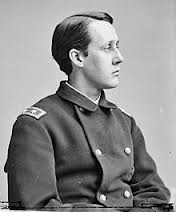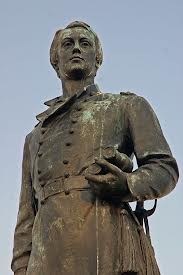 Francis Barlow, Boy General, was born in New York, but was raised a Massachusetts Patriot. Barlow is one, of only a handful, of Union enlistees to rise from the rank of Private to General, during the Civil War. Several regular readers of Civil War Bummer have requested additional information regarding the post-war exploits and adventures of some of the renowned individuals detailed on this site.
Francis Barlow, Boy General, was born in New York, but was raised a Massachusetts Patriot. Barlow is one, of only a handful, of Union enlistees to rise from the rank of Private to General, during the Civil War. Several regular readers of Civil War Bummer have requested additional information regarding the post-war exploits and adventures of some of the renowned individuals detailed on this site.
Francis Channing Barlow, Harvard graduate, New York City attorney, newspaper editor and reporter, an academic, with associates such as Winslow Homer, Dr. Samuel G. Howe, Ralph W. Emerson, Charles Russell Lowell, Jr., and John M. Forbes watched over and promoted his career.
Many of Barlow’s classmates and social acquaintances felt they needed the glory of battle and the inspiration of the warrior philosophy to round out their sphere of maturity. Most didn’t, but Barlow persevered and in spades. Learning military protocols from the inside out and the bottom up, Francis Barlow earned his “Bars and Stars” through his innate leadership ability and a bravery and courage that at times infuriated his troops, yet inspired them to honor and victory. Barlow was wounded twice and neither were flesh wounds, on the contrary both were considered near fatal at the time. His youth and strength held him in good stead, but his long-term health was effected by the injuries.
Francis C. Barlow later directed the energy and dedication he brought to his military career to public service. He was elected secretary of state for New York in November 1865. As a result, he declined a permanent position in the Regular Army and resigned from his rank as major-general of volunteers on November 16. He reestablished his law partnership and opened law offices in New York City in 1866.
He had married, Arabella Wharton Griffith, ten years his senior, in 1861, just days before he left for battle. Arabella had contracted typhus, while nursing in a military hospital, in the capital and died in 1864. In 1867, Barlow married, Ellen Shaw of Boston, sister of Colonel Robert Shaw.
 Barlow was appointed U.S. marshal for the southern district of New York. He reorganized the office of personnel and refused to make political contributions based on compensation of the office, only making a donation on the basis of his salary. Barlow also insisted that his deputies not receive any compensation other than that authorized by law. President Grant assigned Barlow the command of revenue officers of New England, New York and New Jersey. His mandate was to prevent filibustering expeditions to Cuba.
Barlow was appointed U.S. marshal for the southern district of New York. He reorganized the office of personnel and refused to make political contributions based on compensation of the office, only making a donation on the basis of his salary. Barlow also insisted that his deputies not receive any compensation other than that authorized by law. President Grant assigned Barlow the command of revenue officers of New England, New York and New Jersey. His mandate was to prevent filibustering expeditions to Cuba.
Barlow’s attempt to regain the position of secretary of state in 1869 was successful, and the following year he was elected attorney general of New York state. As attorney general, he investigated and prosecuted the “Boss Tweed Ring,” corruption scandal. Barlow founded the American Bar Association and his last public service entailed investigating the disputed presidential election of 1876 in the state of Florida. He then practiced law privately until his death on January 11, 1896. Although he had spent most of his public career in New York, he was buried at his boyhood home of Brookline, Massachusetts.
A statue of Francis Channing Barlow, memorializing the courage of the Boy General and his troops, overlooks “Barlow’s Knoll,” at Gettysburg National Military Park and now you know the rest of his story.
Bummer


Thanks for going in this direction, Bummer, especially when we learn men like Barlow were still heroic in civilian life. We sure could use more like him.
Louis,
Think that men like Barlow still exist, however the futility of honest and dynamic change is so prevalent, that to put it bluntly, it’s like “pissing into the wind.”
The “old guy” once had the physical, mental and financial wherewithal to fight the good fight and succeeded several times. However, the lasting societal impact could not be maintained. That uninfluenced Warrior/Patriot, who is girded for the unceasing battle, is not apparent in today’s United States. Bummer will continue to search. In some respects, historians and academics, debate, discuss and vilify or glorify military and political giants of 150 years ago, but fail to identify why we don’t have that caliber of warrior/statesmen in today’s volitile world. Joshua Chamberlain said it best,
“I fear, this war, so costly of blood and treasure, will not cease until men of the North are willing to leave good positions, and sacrifice the dearest personal interests, to rescue our country from desolation, and defend the national existence against treachery.”
Bummer